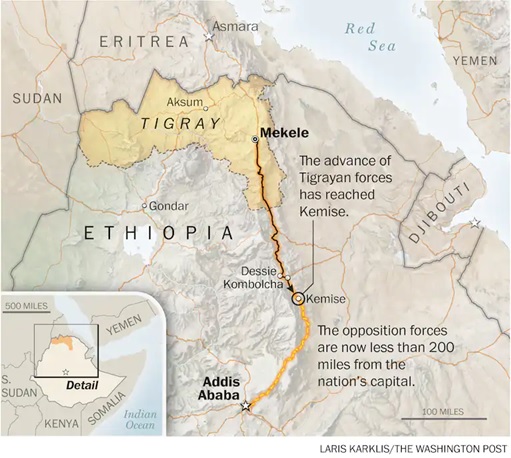By Max Bearak

NAIROBI — After a year of grinding conflict in Ethiopia’s mountainous north, thousands of opposition forces this week pushed their way to within 200 miles of the capital Addis Ababa, forcing the city’s residents to gird for the possibility that the war will soon be on their doorsteps and triggering a cascade of frantic preparations across the region.
The Ethiopian government has called the fight against former government soldiers and volunteers from the country’s Tigray region an “existential war,” and Prime Minister Abiy Ahmed, who won the Nobel Peace Prize two years ago, has vowed to “bury this enemy with our blood and bones.”

Abiy declared a state of emergency that allows for conscription of “any military age citizen who has weapons.” The mayor called on residents to take up arms to secure their neighborhoods. The military asked veterans to reenlist. The U.S. Embassy urged its citizens Friday to leave the country “as soon as possible.” Later Friday, the U.N. Security Council called for an end to the conflict and expressed concern about the impact on “the stability of the country and the wider region.”
Police in Addis Ababa have begun going door to door, searching for Tigrayans who may be sympathetic to the Tigray People’s Liberation Front, or TPLF, which is leading the rebel offensive and whose members the government considers secessionist terrorists. The TPLF dominated the country’s politics for three decades before Abiy took power, and are deeply resented by many of Ethiopia’s non-Tigrayans.
“I live in an apartment, and I have neighbors. In ordinary times, they heard me speak Tigrinya on phone, so some must know,” said Alula Mikaelson, 30, speaking by phone from Addis Ababa. Like many Tigrayans, Alula fled to Addis Ababa at the beginning of the war, seeking to blend in. Tigrayans speak their own language but are physically indistinguishable from numerous other Ethiopian ethnicities.
“Even right now, I am speaking to you in a low tone because if someone hears me, they can call the police who will come here and take me,” he said.
The crackdown has highlighted the increasingly ethnic nature of the war. Government officials including Abiy have increasingly used inflammatory language when referencing Tigrayans, and the TPLF argues it is fighting for the survival of its people in Tigray, who have been under an effective blockade since the war began last November.
The intransigence on both sides has scuttled hopes of a cease-fire that international mediators including the African Union and the United States were pressing for, and fears have pulsed beyond the country’s borders as the heavyweight of this volatile region teeters on the brink of chaos.
With more than 110 million people, Ethiopia is the 12th most populous country in the world and dwarfs its neighbors in population.
“If it is existential for Ethiopia, it is existential for us, too,” said a senior Djiboutian official, who spoke on the condition of anonymity to discuss the matter candidly. He and other diplomatic sources said they were concerned that a rebel push toward Addis Ababa would lead to a surge in refugees seeking to cross into neighboring countries.
Unpublished contingency plans being made by the U.N.’s refugee agency and reviewed by The Washington Post predict hundreds of thousands of refugees may try to enter Djibouti, Kenya and Somaliland, an autonomous region of Somalia.
Addis Ababa, home to around 5 million people, is sometimes referred to as the “capital of Africa” — hosting the African Union headquarters, the United Nations Economic Commission for Africa and Ethiopian Airlines, the continent’s largest and most essential for trade and travel.
While life for some continued on as normal, Tigrayan residents described a fast-moving police operation that had upended any sense of safety in the city and driven most into hiding.
“Everyone is absolutely terrified,” said Lemma, 27, an Addis Ababa resident who recently fled to Kenya and spoke on the condition that she be identified only by her second name for fear of reprisals against her family in Ethiopia. “Most of my family do not have passports, and they are being rounded up as we speak and taken to unknown concentration camps.”
She said that on Tuesday her 75-year-old uncle, who is diabetic, had been picked up by police at his office, two more cousins on their way to buy food had been detained after police checked their identification cards, which marked them as Tigrayan, and a friend’s father was detained at the airport as he tried to board a flight to Rwanda for a medical checkup. None have been reachable since.
Asked about the crackdown, police officials told Reuters that they had made many arrests in recent days of people accused of supporting the rebels.
“We are only arresting those who are directly or indirectly supporting the illegal terrorist group,” police spokesperson Fasika Fanta said. “This includes moral, financial and propaganda support.”
On Wednesday, the United Nations and Ethiopia’s state-appointed human rights body co-released a report detailing the “extreme brutality” meted out by both sides of the conflict on civilians over the last year. The report, while not exhaustive and hampered by restricted access to the conflict zone, documented some of the volleys of heinous recriminations that have driven this war.
Independent human rights groups and news outlets have reported on dozens of atrocities and rampant hate speech. The conflict has taken thousands of lives and spawned one of the world’s worst humanitarian crises.
The TPLF claims to be pushing toward Addis Ababa as a way to force the government to lift restrictions on aid flowing to the region.
While stopping short of saying the government was committing genocide or using starvation as a war tactic, the report alleged extensive crimes by government forces and their allies that could constitute war crimes and decried heavy restrictions on aid supplies to Tigray that have brought hundreds of thousands to the brink of famine. The TPLF also carried out indiscriminate massacres, forced displacement and rapes, the report said.
Source: WP


